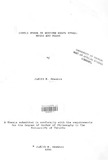| dc.description.abstract | While applying their unique and distinct traditional knowledge, farmers, for centuries have
managed to feed their families, while evading situations of food insecurity. However, this
knowledge is rarely taken into consideration in the design and implementation of the modem
mainstream knowledge in agricultural production. It has been labeled primordial and unable
to feed modem societies. Given the magnitude of the current situation of food crisis,
incorporation of all existing knowledge in food production is of much importance. This study
focused on exploring women's indigenous knowledge (IK) in household food security in
Mulilii sub-location, Makindu district of Eastern Kenya.
Data was collected by use of in-depth interviews, survey method, observation technique and
focus group discussion. The study found out that indigenous knowledge still exists, though
largely practiced in small scale. It is cheap, locally available and well entrenched in the
farming practices of the local people.
There exists too, certain traditional coping (short-term) strategies that women turn to in times
of food scarcity, shielding their households from the effect of the same. With the current
issue of climate change, resulting to new challenges such as, unpredictable and unreliable
rains, prolonged spells of drought and increased temperatures, the local people, through their
indigenous knowledge systems, have developed and implemented extensive strategies in their
farming practices that have enabled them to reduce their vulnerability.
However, IK is currently facing a number of challenges that risk it being completely phased out
or totally sidelined from the mainstream knowledge in food production. In the current
times, with the shift to large-scale farming and the global climatic changes the effectiveness
of indigenous knowledge is progressively getting decimated. Despite the challenges, though,
there exist gaps that can be exploited to enhance its transmission, usage and preservation as
well as its capacity to serve the needs of the small-scale poor resource farmers.
The study concluded that IK is of much value to the small-scale subsistence farmers. It is not
only the most cost-effective and easily available knowledge that majority of the resource poor
farmers turn to, but also, it is an inherent knowledge adhered to and practiced as part of
culture. It is however, inexcusable that this knowledge is accorded dismal recognition in the
current political administration and research policies. This dismal state of recognition has
made it difficult to inquire, determine and establish the extent to which local farmers use their
indigenous knowledge in their farming activities.
The study has recommended that instead of giving IK less attention, more research should be
undertaken to establish the effectiveness of this knowledge that the indigenous people have
persisted with since time immemorial. It is time that research scientists, particularly, in the
field of agriculture, began to work closely with indigenous communities to promote a mutual
interest in sustained and improved food production. Governing policies should also take into
account and support the knowledge of the local people. Challenges facing IK should also be
revisited and, more importantly, alleviated. This should be done in the concerted effort of
seeking a multi-faceted solution to the prominent issue of food insecurity. | en |

